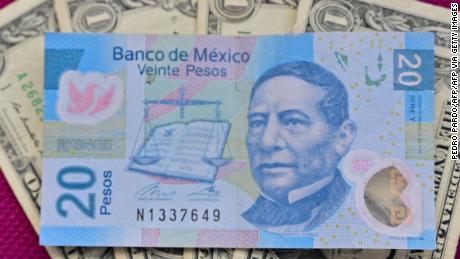The US elections in November could introduce significant volatility for the Mexican peso (MXN), surpassing the impact of Mexico’s own upcoming presidential vote. Investors should consider hedging this risk through a derivatives trade, according to JPMorgan Chase (JPM) The bank recommends a strategic approach to safeguard investments, given the peso’s recent strong performance amidst a volatile global economic landscape.
JPMorgan’s strategists, including Saad Siddiqui and Tania Escobedo Jacob, suggest selling a three-month USD/MXN digital call with a strike price of 18.50 while simultaneously going long on a six-month digital call at the same strike price. This recommendation comes as the bank maintains an overweight position on the peso, highlighting its attractiveness among emerging market currencies due to low volatility and high interest rates. The strategists emphasize the need to hedge against the potential for a more contentious US approach to trade and migration issues, especially with concerns over Chinese evasion of tariffs through Mexico.
Market Overview:- Concerns about a more "contentious" US trade approach towards Mexico pose risks.
- JPMorgan recommends a hedging strategy using derivatives to mitigate risks associated with the US elections.
- The peso has emerged as a top performer among emerging market currencies, appreciating 19% against the dollar in the last 24 months.
- Mexico's upcoming presidential election and potential USMCA review in 2026 add to the uncertainty.
- JPMorgan remains bullish on the peso in the medium term, citing factors like rising remittances and nearshoring trends benefiting Mexico.
- Investor focus will shift towards the US elections and their potential impact on US-Mexico relations.
- The peso's resilience and Mexico's economic fundamentals suggest it remains a compelling EM currency holding.
Over the past 24 months, the Mexican peso has rallied 19% to around 16.7 per dollar, making it the best-performing developing nation currency during this period. This performance is attributed to its stability and high interest rates, which have helped it defy predictions of overvaluation. Mexico’s presidential elections scheduled for June 2, with Claudia Sheinbaum as the frontrunner, and the upcoming US elections, where the stance on the USMCA trade deal remains uncertain, add to the currency’s potential volatility. JPMorgan notes that while President Joe Biden and former President Donald Trump have not recently addressed the USMCA, the deal is up for review in mid-2026, and changes could be prompted by the election outcome.
Despite the uncertainties, JPMorgan holds a constructive view on the peso, citing rising remittances and benefits from the near-shoring trend, where manufacturers move operations closer to home, favoring Mexico. The strategists argue that the peso has evolved from a high-beta risk proxy currency to a more stable asset on a secular appreciation trend. This transformation positions the peso as one of the most attractive emerging market currencies for medium-term investment, supported by its resilience and strategic economic advantages.




